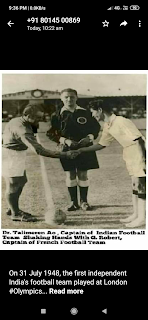On 31 July 1948:
THE first independent India's football team played at London Olympic
FRANCE Vs INDIA
France vs India
India lost 2:1
THE Indian Football team, who played BAREFOOT, was led by Eno. Talimeren Ao from Nagaland. He was also a Doctor by profession.
After his team came close to upsetting fancied France in the 1948 London Olympics, India skipper Talimeren Ao was asked why his team played barefoot. “In India, we play football, whereas you play bootball!” he said, winning the British media over with his wit.
A few years later, Ao stepped into a doctor’s shoes to virtually boot the footballer out of his persona, as did the Naga Hills of Assam that eventually became Nagaland.
But the State has rediscovered the legendary footballer — captain of independent India’s first soccer team in the Olympics — in the year of his birth centenary. Nagaland’s coalition government, headed by Neiphiu Rio, has decided to rename the Indira Gandhi Stadium in the capital Kohima after Talimeren Ao.
Many, including his wards, would rather have a new stadium named after him, lest a government in the future should revert to the stadium’s original name.
How did he play for India?
Very few footballers have gone on to become doctors. Ao was not just an exception; in 1950, he became the first Naga to complete his MBBS. That was two years after the most glorious phase of his life as the first Naga Olympian. But a foul by an opponent in a club-level competition had threatened to end his career before it had begun in 1938. He had joined Guwahati’s Cotton College — the best in the Northeast since 1901 — for his intermediate science that year, was elected general secretary (athletics and sports) of the college and became a regular in the college football team. In a match against a local club, a player drove both fists into his jaw as he headed the ball. He spent weeks in hospital but returned the following year to help his college team win all local trophies. He graduated to Kolkata’s Mohun Bagan club while studying at Carmichael Medical College (now R.G. Kar Medical College), helped Bengal win the Provincial Santosh Trophy in 1945 and was offered the captaincy of the Indian football team at the 1948 London Olympics. At Wembley Stadium in London, he was the flag-bearer of the Indian contingent.
Why did he stop?
Young Talimeren was as much inclined to academics as he was to athletics; a lesser-known fact is that he, as a student, held the unofficial Indian long jump record of 23 ft for several years. He was the fourth of Reverend Subongwati Ningdangri and Maongsangla Changkilari’s 11 children, born on January 28, 1918, at Changki village in the Naga Hills of undivided Assam. His love for football did tend to affect his studies, but his father’s death in 1935 — and a dying wish for his son to become a doctor — made him devote as much time to academics as sport. A scholarship from the Assam government in 1942 to study medicine helped him fulfil his father’s wish eight years later. In 1951, still at his prime as a footballer, he hung up his boots. In 1953, he became the medical superintendent at Kohima Hospital, where he treated, and operated on, patients. In 1963, when Nagaland attained statehood, Ao became the first Naga director of health services and held the post till retirement in 1978.
What made him popular again?
In 1968, Ao became a member of the All India football selection committee. But, as the Nagaland Olympic Association says, he did not get the recognition he deserved in his homeland. One of the reasons was probably because he played for India at a time when the Naga struggle for sovereignty had taken root. But the State’s sportspersons rue that Nagaland virtually ignored Ao while West Bengal and Assam revered him, naming a stadium (at Kaliabor) and the Cotton College indoor stadium after him. Ao probably foresaw this, etching his soccer feats in the names of his sons – Talikokchang, meaning ‘he who has excelled’ in the Ao Naga dialect, and Indianoba, meaning ‘one who led India.’ Father, Indianoba said, was too humble to demand attention but welcomed the government’s new-found appreciation for the football legend. “But we would prefer a new stadium to be named after him, not an existing one named after a former Prime Minister,” Talikokchang said.






No comments:
Post a Comment